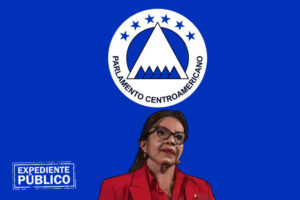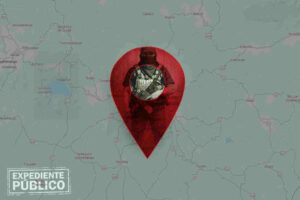* Nicaragua, Cuba, Venezuela, and El Salvador are among the countries with the highest number of political prisoners.
** Around 65 countries report arbitrary detentions, mainly against human rights defenders, journalists, and opponents of the government.
Expediente Público / Washington
Thinking, expressing opinions, and acting in opposition to authoritarian governments in Latin America and other parts of the world are increasingly criminalized practices. Experts from Freedom House point to a growth in the number of political prisoners worldwide.
The list of people detained for political reasons is headed by human rights defenders, journalists, political opponents and, in cases such as Nicaragua and Cuba, even religious figures.
“There is a pandemic of political imprisonment around the world,” says Katie LaRoque, director of policy and advocacy at Freedom House.
Expediente Público spoke with her and two other specialists from the same organization: Brian Tronic, director of the program for the freedom of political prisoners, and Alejandra Argueta, deputy director for Latin America and the Caribbean.
Subscribe to the Public Record newsletter and receive more information
They argue that the increase in arbitrary detentions is due to democratic setbacks in regions all over the world.
More despotic leaders
Freedom House keeps a detailed record of the situation of political prisoners around the world, which is published annually in its report on “Freedom in the World.” The organization has been monitoring and promoting freedom and democratic values for 85 years.
Brian Tronic asserts that the main symptoms of the increase in political prisoners are related to the growing incursion of “despotic leaders” who imprison people for defending “human rights and for speaking out.”

Read: Ortega-Murillo dictatorship orders increased surveillance of citizens in Nicaragua
He also argues that these governments penalize freedom of expression by imprisoning journalists, political leaders who oppose them, “and many others who are perceived as opponents of the regime for any reason.”
But what is most serious for this expert is that countries with authoritarian governments “are learning from each other and, perhaps, sharing practices in terms of political imprisonment.”
He cites as an example the creation of similar legislation, such as foreign agent laws or other laws to counter what these regimes consider attacks on national sovereignty, with crimes such as treason. These countries “use similar repressive laws to attack certain populations,” Tronic notes.

Latin America also plays a role
Turning the spotlight on Latin America, Alejandra Argueta believes that governments accused of human rights violations are trying to camouflage their actions as matters of national security.
Argueta cites the cases of Venezuela, Nicaragua, and Cuba. Regarding the first country, she points out that there are thousands of detainees charged with treason, terrorism, and other crimes for demanding that last year’s election results be respected, arguing that the majority of the votes counted Edmundo González as the winner and not Nicolás Maduro.
The specialist adds that similar actions have been unleashed in the waves of repression against the Nicaraguan population since the crisis began in April 2018. Since then, international organizations such as the Inter-American Commission on Human Rights (IACHR) have kept a detailed record of those killed, injured, and imprisoned in actions directed by the dictatorship.
Argueta maintains that the same thing happened in Cuba after the July 2021 protests, when thousands of people took to the streets to demand freedom and improvements in their living conditions, which led to thousands of arrests.
“They all act under the pretext of public safety or the stabilization of society, but in reality, they are targeting defenders of democracy and human rights,” Argueta points out.
Also: Nicaragua and Russia grant each other immunity from international justice
For this expert, it is no coincidence that legislation in Venezuela, Nicaragua, and now El Salvador contains similar language in its rationale to counter external influences. She refers to laws known as Foreign Agents laws, which control the registration and operation of civil society organizations.
“The registries are created to delve deeper into the work carried out by NGOs, gather information, and contribute to the collection of intelligence by these autocratic regimes with the sole purpose of criminalizing the work carried out by these organizations and developing unfounded accusations,” Argueta maintains.
In addition: Relatives of political prisoners in Venezuela seek their freedom
In Nicaragua, the government revoked the legal status of about 1,500 non-governmental organizations last year, including 700 religious organizations. It also ordered the closure of private universities, declaring them a “risk” to state security, an action that has been condemned by the international community.
El Salvador at a turning point
Similarly, Argueta believes that in El Salvador, Nayib Bukele’s government has taken significant steps to reinforce its authoritarianism in recent months.
“I believe that in El Salvador, as we have seen in recent months, perhaps in May, there was a radical change. It is a momentous turning point because I believe that the cases of (Ruth) López and (Enrique) Anaya show clear signs that they are politically motivated, that there is something behind the work these people are doing in the fight against corruption, and that there is rigorous scrutiny of the government’s abuse of power,” says the expert.
Also Read: Cristosal to denounce authoritarianism in El Salvador from exile

Prisoners for exchange
For Katie LaRoque, authoritarian governments promote arbitrary detentions to use political prisoners as bargaining chips or to soften sanctions.
“There is a very cynical practice: many regimes negotiate with Western or democratic governments for the release of a handful of political prisoners in exchange for lifting sanctions to, in some way, alleviate some of the punitive measures that the democratic world imposed on these governments in response to their internal repression,” says LaRoque.
In addition: Sara Gálvez: Russia exports manual on state capture

In addition, these human rights violations are also used to exchange prisoners. On July 18, the United States and Venezuela made an exchange. Nicolás Maduro’s regime released approximately 80 political prisoners, some of them Americans, in exchange for the return of 250 Venezuelans who had been expelled from the United States to El Salvador, to the Center for the Confinement of Terrorism (CECOT).
Former Deputy Assistant Secretary of State for Human Rights, Democracy, and Labor, Enrique Roig, told Expediente Público that, for the time being, the Trump administration does not have a defined policy on political prisoners and has focused its actions on transactions, such as the one carried out with Venezuela.
This practice is not new. During Joe Biden’s administration, the United States and European countries negotiated exchanges for Russia to release American prisoners and Russian dissidents accused of espionage or violating its Foreign Agents Registration Act.
In exchange, Russian criminals serving sentences for murder, arms trafficking, cyberattacks, and other crimes, who had been tried under due process guarantees, were released.
Brian Tronic points out that “some of the most problematic countries in terms of political imprisonment may be important partners in trade, security, counterterrorism, or the fight against international drug trafficking,” which complicates the issue.





